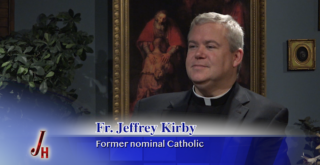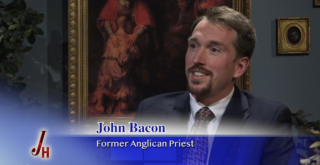“Many, many people hereabouts are not becoming Christians for one reason only: there is nobody to make them Christians. Again and again I have thought of going round … and everywhere crying out like a madman, riveting the attention of those with more learning than charity: ‘What a tragedy: how many souls are being shut out of heaven and falling into hell, thanks to you.’”
The above statement was once made by a great missionary saint, but to what extent does it still apply to the neighborhoods in which we live? Certainly a great number of our neighbors, of the people we drive by in our cars or pass by with our shopping carts, are not Christians — or at least not practicing Christians. In fact, the most recent polls say the number of practicing Christians in America is falling significantly. And when we listen to the news, it seems that increasingly all the moral and religious aspects of our culture, which were once formed by Christian leaders or on Christian principles, are being questioned, denounced, even outlawed.
Maybe we can think of lots of reasons so many of our neighbors are not practicing Christians. Or is the primary reason the same given by this missionary saint: “there is nobody to make them Christians.” We might cry back defensively, “But this is not true! We have our bishops and priests and deacons! That’s their job, to make people Christians!”
But is it? Scripture says, “And his gifts were that some should be apostles, some prophets, some evangelists, some pastors and teachers, to equip the saints for the work of ministry, for building up the body of Christ” (Eph 4:11-12). St. Paul’s use of the term “saints” here does not refer only to those who have died and gone to heaven, or the few of us who might eventually qualify; rather, he means, in essence, that the ordained Church leadership have been called by God to equip us — you and me, members of the Body — for the work of making our neighbors Christians.
Are we guilty of having “more learning than charity”? To put the question another way, are we guilty of being more distracted and captured by our own self-focused priorities than for the eternal salvation of our neighbors and friends? “What a tragedy: how many souls are being shut out of heaven and falling into hell, thanks to you [and me].”
By the way, the above statement was made by St. Francis Xavier, nearly 475 years ago. He was specifically crying out for university students from Paris to heed the call to proclaim the gospel, to give up their secular ambitions in order to become missionaries to those in pagan lands who had never heard the gospel.
Is this mission still as great today? We believe so, which is why we truly appreciate your partnership in this missionary endeavor. Our present twenty-first century missionary field is a bit different, however, than St. Xavier’s. Today we are surrounded by thousands of people with thousands of different understandings of God, Christ, Christianity, the Church, faith, salvation, of what difference it even makes whether one is a Christian or not. We are surrounded by contented confusion, where most people have given up even trying to answer the big questions of life.
This is the mission field into which you and I were planted by God, with His gifts, and with our opportunities to proclaim and demonstrate His goodness.
As difficult, awkward, and maybe embarrassing as this task might be, we are not doing this alone, for the Church teaches that: “Rising from the dead, [our Lord Jesus Christ] sent His life-giving Spirit upon His disciples and through the Spirit established His Body, which is the Church, as the universal sacrament of salvation. Seated at the right hand of the Father, He works unceasingly in the world, to draw men into the Church and through it to join them more closely to himself, nourishing them with his own Body and Blood, and so making them share in his life of glory” (Lumen Gentium, 48).
And how does He do this “unceasingly in the world”? Certainly through the Pope, bishops, priests, deacons, religious, etc., and all aspects of the Church’s outreach. But honestly, how many of our non-Catholic friends and neighbors are they going to reach? How many of our non-Catholic friends and neighbors — especially non-Catholic clergy — will even pay one moment’s attention to anything any Catholic pope, bishop, or priest says, given the underlying anti-Catholic prejudice and ignorance so abundant in America?
This is why the Coming Home Network International is here: to provide (alongside many other apostolates) an opportunity for you and me to work side-by-side to help our non-Catholic friends and neighbors break through the prejudice to discover the fullness of Christ and His Church. We know from experience that evangelization is difficult — but we must not let this stand in the way of our “charity.” This is why we provide so many resources — on-line and in print — to make this mission as easy as possible.
It is not our responsibility to “push, pull, or prod” anyone into the Kingdom; all we are called to do is share with them what we have received by grace through the mercy of God. It is through your words and efforts — for example, by pointing someone to our website or passing along a CHNewsletter or giving them a book — that Christ can work to “draw men into the Church and through it to join them more closely to himself.”
Thank you for working with us in this grand mission. Thank you for your prayers and financial support, but especially for your active witness to Christ and His Church. May we, together with those whom Christ has brought home through our witness, “share in his life of glory.”










